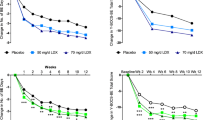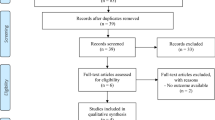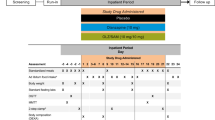Abstract
OBJECTIVES: To assess the weight-reducing effects and tolerability of 5 mg, 10 mg and 15 mg daily doses of sibutramine, a novel serotonin and noradrenaline reuptake inhibitor (SNRI).
DESIGN: Multicentre, double-blind, and placebo-controlled study. After a one week run-in period, patients were randomized to receive placebo or sibutramine over a 12-week period. Advice on diet and behaviour modification was provided. One follow-up was conducted four weeks after cessation of treatment.
SUBJECTS: 235 obese outpatients, aged 18–65 y with a body mass index (BMI) within the range 27–40 kg/m.
MEASUREMENTS: Weight, height, waist and hip circumference, and medical history, assessment of hunger, satiety, appetite and craving for sweet, savoury and carbohydrate foods, and also for carbohydrate snacking, standard laboratory assessments, blood pressure, heart rate and ECG.
RESULTS: The group mean (±s.e.m.) weight loss at end-point was 1.4±0.5 kg for placebo (n=59), 2.4±0.5 kg for 5 mg sibutramine (n=56), 5.1±0.5 kg for 10 mg sibutramine (n=59) and 4.9±0.5 kg (n=62) for 15 mg sibutramine. The difference observed between the placebo and the 10 mg and 15 mg groups was statistically significant from week 2 onwards (P<0.01), but there was no significant difference between these sibutramine groups. The percentage of patients losing >5% of initial bodyweight was significantly greater for 15 mg sibutramine (55%) and 10 mg sibutramine (49%) than for treatment with placebo (19%), (P<0.001). During the double-blind period, 41 patients (17%) withdrew prematurely and 168 patients (71%) reported 453 adverse events. The incidence and type of adverse event and the rates of withdrawal, were not significantly different in the four groups. No significant differences between the groups were observed, in respect of changes in systolic and diastolic blood pressure, but a significant increase in heart rate (about 4 beats/min) was noted for patients who received 10 mg or 15 mg sibutramine, compared with the placebo (P<0.001).
CONCLUSION: These data demonstrate dose-related weight loss with sibutramine treatment for up to 12 weeks in obese patients. Doses of 10 mg and 15 mg once daily were shown to be similarly effective, well tolerated and significantly more effective than the placebo.
This is a preview of subscription content, access via your institution
Access options
Subscribe to this journal
Receive 12 print issues and online access
$259.00 per year
only $21.58 per issue
Buy this article
- Purchase on Springer Link
- Instant access to full article PDF
Prices may be subject to local taxes which are calculated during checkout
Similar content being viewed by others
Author information
Authors and Affiliations
Rights and permissions
About this article
Cite this article
Hanotin, C., Thomas, F., Jones, S. et al. Efficacy and tolerability of sibutramine in obese patients: a dose-ranging study. Int J Obes 22, 32–38 (1998). https://doi.org/10.1038/sj.ijo.0800540
Received:
Revised:
Accepted:
Published:
Issue Date:
DOI: https://doi.org/10.1038/sj.ijo.0800540
Keywords
This article is cited by
-
Cetilistat (ATL-962), a novel lipase inhibitor: a 12-week randomized, placebo-controlled study of weight reduction in obese patients
International Journal of Obesity (2007)
-
The Perceived Effectiveness of Continuing Care and Group Support in the Long‐Term Self‐Help Treatment of Obesity
Obesity (2006)
-
Sibutramine and the sympathetic nervous system in obese humans
Clinical Autonomic Research (2005)
-
Analysis of the anorectic efficacy of HMR1426 in rodents and its effects on gastric emptying in rats
International Journal of Obesity (2004)
-
Effect of Sibutramine on Weight Loss and Blood Pressure: A Meta‐analysis of Controlled Trials
Obesity Research (2003)



